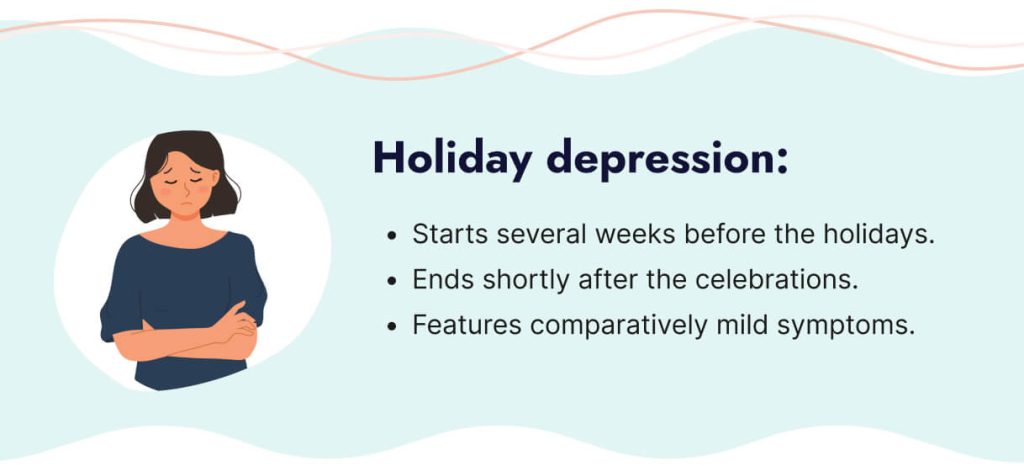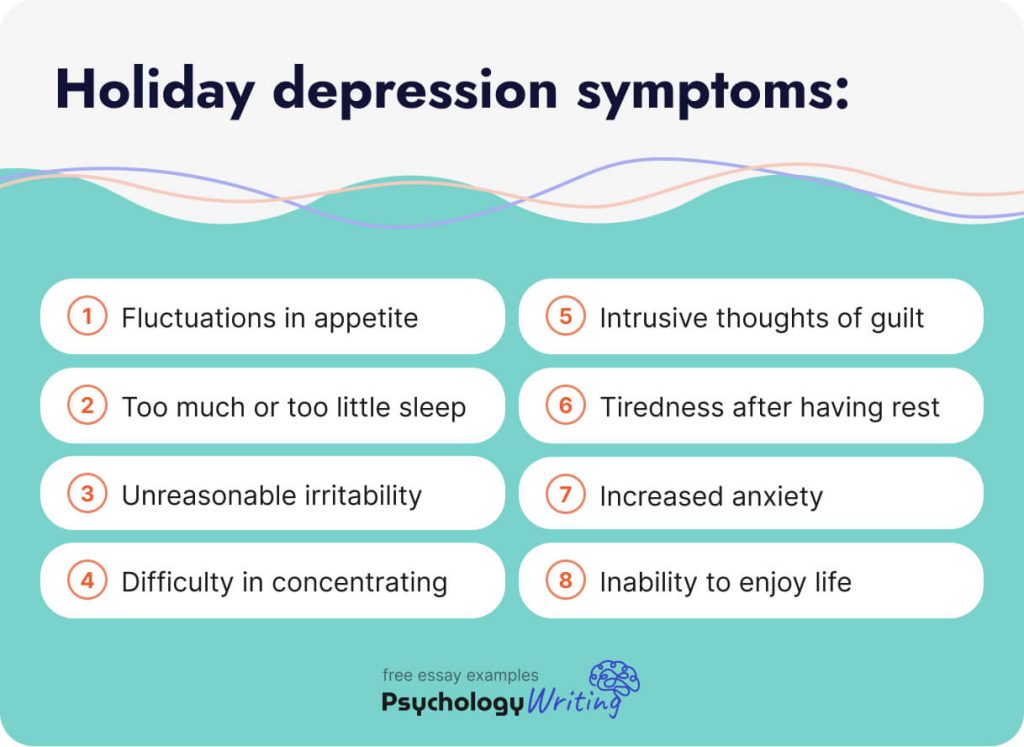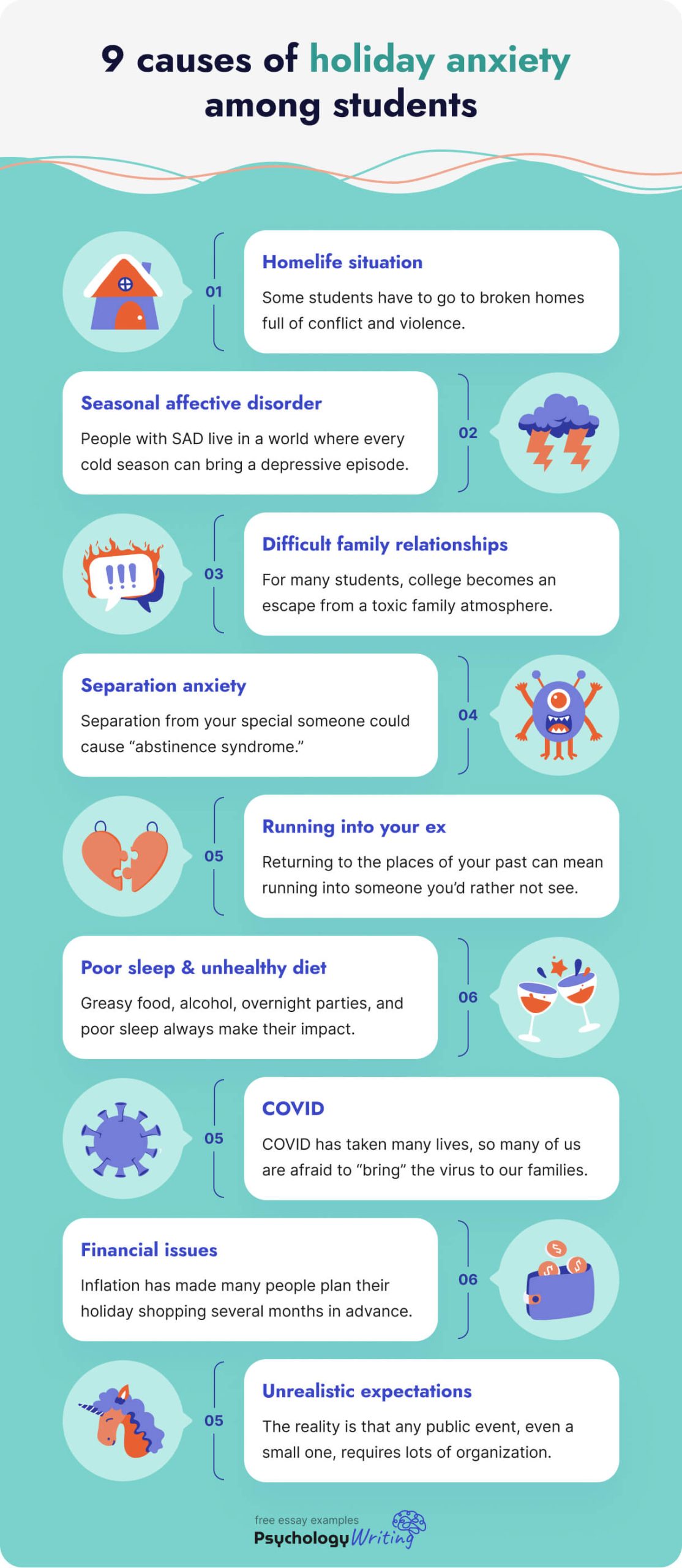We were all children once, and returning to our parents’ homes for the holidays can be an uplifting experience that boosts our morale. Eight out of 10 young people say this is true for them.
But what about the others?
Unfortunately, home sweet home might not be so sweet for some students. It’s a sad fact that what should be an inspiring and peaceful trip can turn into an additional source of stress and anxiety.

This article analyzes the causes of that problem. Understanding the reasons for your feelings and concerns is half the battle. We’ll also give you 9 tips for coping with holiday stress that will help you the rest of the way.
😵 Holiday Anxiety & Stress: Definition & Symptoms
Holiday anxiety and stress are often called the holiday blues, as if they were just a bad mood that comes and goes. However, this condition can stay with you the entire holiday season.
Shopping for gifts and meeting your family members can take you on an emotional rollercoaster. But have you ever considered that your expectations for those few weeks can worsen your anxiety?
The holiday season brings more responsibilities than usual. Harward’s Department of Neurobiology says that having too many duties sends our prefrontal cortex into overdrive.
Or, to put it simply:
If the stress lasts for only a day, our brain can cope. However, even a week-long stretch of tension decreases memory, halts new brain cell production, and kills existing cells.

Having several of the following symptoms may indicate that’s holiday depression:
- Fluctuations in weight or appetite
- Too much or too little sleep
- Unreasonable irritability
- Difficulty in concentrating
- Intrusive thoughts of guilt and shame
- Tiredness, even after having rested
- Increased anxiety
- Inability to enjoy the things that used to bring pleasure
These are the tell-tale signs of a depressive episode.
You can take a test to see whether you’ve passed the threshold of depression and need to take some decisive actions.
The holiday blues are not a problem for every student. Still, there are groups of people who suffer from pre-celebration anxiety more than others.
For instance:
- Students who identify themselves as LGBTQIA+ feel more stressed about visiting their families during the holidays (60%) than cisgender students (51%).
- Non-binary students (91%) are much more anxious or depressed about the holiday period than their male (44%) or female (55%) peers.
🎃 7 Common Causes of Holiday Anxiety among Students
We are all so different in both positive and negative ways. We have listed the most common reasons for holiday anxiety among young people. Acknowledging the source of the problem is key to resolving it.

1. Homelife Situation
Unfortunately, only some students are lucky enough to live in a stable home environment. They can enjoy the break and recover before the new semester, but others go to broken homes full of conflict and violence. They might also have to take care of their siblings while their parents work.
You cannot fix your family or find another one. But you can accept the people you have and do your best to create a healthier household.
2. Seasonal Affective Disorder
Holiday anxiety has a scientific counterpart, seasonal affective disorder (SAD). However, there are differences.
Here’s how you can differentiate the two:
People with SAD live in a world where every cold season brings another depressive episode. If that were not enough, December can bring the holiday blues, too.
If that’s the case for you, try to realize that this stressful combo worsens your symptoms. Remember that the sun will come out and clear away your depression.
3. Difficult Family Relationships
It would be wrong to ignore the fact that college can sometimes become an escape from a toxic family atmosphere. This cause of holiday anxiety is the most severe and hardest to overcome.
Complicated families can be very different. An overly critical parent may make you feel like you’ll never achieve anything. A jealous sibling could make you think twice before sharing your aspirations and achievements. Unnecessary drama is always stressful.
4. Separation Anxiety
During your college years, you will likely have a close friend or a romantic partner who plans to spend the holidays with their family. The early stage of romantic love shares many common symptoms with addictions, so being separate from your special someone could cause “abstinence syndrome.”
Don’t be afraid of the separation. Your feelings will only grow stronger, and you will share many more exciting moments upon your return.
5. Running into Your Ex
Returning to the places of your past could mean running into someone you’d rather not see. The chances of this uncomfortable encounter grow if you come from a small town where everyone knows everyone else.
Our advice is to be ready to treat your ex as an old friend. It’s better to keep the conversation on lighter topics and make it short. Remember that you can leave as soon as you feel uncomfortable.
6. Poor Sleep & Unhealthy Diet
Despite being the most wonderful time of the year, holidays are the least healthy one. Loads of greasy food, alcohol, overnight parties, and poor sleep always make their impact. A recent study has established a correlation between these factors and depression, particularly among overweight people.
Try to eat something healthy from the wide selection of foods on your table. Don’t be the last one to go to bed, or you’ll make the holiday blues even worse.
7. COVID
Since 2019, we haven’t stopped worrying about our older relatives. COVID has already taken many lives, and many of us have been afraid to “bring” the virus to our families.
Meanwhile, some students may feel anxious about being in the same room with many other people. Only 30% of American responders felt comfortable enough to see their relatives during the pandemic. That’s why COVID remains a decisive factor in how students plan their holidays.
8. Financial Issues
Although financial problems aren’t the primary issue surrounding the holiday blues, they also have their impact. Inflation has made many households plan their holiday shopping several months before the celebrations. Just thinking about everything you will need in the next two or three months can definitely make you anxious. Any emergency undermining your plans will feel twice as unpleasant.
9. Unrealistic Expectations
Advertisements and movies show happy families celebrating a merry Christmas altogether. Food appears out of nowhere, and everyone enjoys a relaxed conversation. Those scenes make us feel obligated to have the same “quality” of celebration.
The reality is that any public event, no matter how small, requires lots of organization. And if you are not one of the few people who enjoy that kind of work, you will probably be stressed on the big day.
Our advice here is to know your limits and stick to them. Then, anything else will be a pleasant surprise.
🎄 9 Tips for Coping with Holiday Stress
Holiday blues can and should be treated. Speaking with a psychotherapist is a good idea, but there are also some things you can do independently.

Tip #1: Be Realistic
Is your mother critical of your looks? Or is your father-in-law aggressive about your social views? Sometimes acceptance has healing power. Plan in advance how you will react to their habitual criticism.
What is your primary source of stress during the holidays? Perhaps your grandmother keeps asking when you will give her great-grandchildren. You try to explain that her inquiries make you feel uncomfortable. But no matter your reasoning, she asks you the same thing every time you see her.
Accept their behavior as a fact. After all, the grandma is free to dream of whatever she wants. Get ready with a generic phrase so as not to be caught off guard. And most importantly, acknowledge your emotions and plan how to deal with your and your relatives’ feelings. This is critical for healthy communication.
Tip #2: Know What Matters & Why
Some people confuse being realistic with being pessimistic.
Do you keep noticing the same helpless thoughts visiting you several times during the same day?
There are 2 possible reasons:
- The circumstances are really that bad. It would be best to consider staying on campus throughout the holidays or finding another way to spend the days off.
- You are overthinking past grievances. Some of us struggle to forget the difficult moments we have experienced. If that’s your case, we recommend finding ways to let these painful memories go.
In both cases, we highly recommend that you talk to a psychology professional. Many educational institutions offer such services for free. Speaking with them can help you understand how you feel about the situation that is bothering you and why.
In fact, your grandmother might not even ask about great-grandchildren again. Instead, she might ask your forgiveness for being disrespectful. Why be nervous before something happens?
Tip #3: Take Care of Yourself
Think of the holidays as a period to put everything on standby and mute your phone. Our life has become so fast that slowing down can have a revitalizing effect.
The best way to enjoy the days off is to abandon your social media accounts, read a good book, take long walks in the fresh air, and do nothing at all if you want.
If you routinely visit a psychotherapist, we recommend not suspending those sessions even for a short while. Although arranging an online meeting in a private space can be challenging, it is worthwhile for your mental health. Holidays are often even more stressful than your everyday life, so you’ll need more emotional assistance than usual.
Tip #4: Stick to Your Routine
Holidays constantly undermine our routine. As a result, we often lack sleep or confuse daytime with nighttime. International students often become jet-lagged if their home is in a distant country. Carb-rich food and sugary desserts add up to an overall unhealthy lifestyle.
All these changes will impact your health at some point, especially if you are suffering from the holiday blues.
Here’s a brief list of advice:
Tip #5: Think of Your Budget
If the thought of spending a fortune purchasing presents for everyone stresses you out, these tips might be helpful.
- DIY presents are the cheapest, although the most time-consuming. You can find doable examples on YouTube. Still, we’d recommend this option only to those good at working with their hands.
- Buy all your presents at the same place to get a discount. Even if you don’t receive a monetary discount, at least you’ll save the time that you would have spent wandering around several shopping centers.
- Ask your family what they need. They won’t ask for something too expensive, and you’ll be sure to pick out exactly what they want.
- Set a budget you can spend and distribute it among the gifts you need to. buy. It is easier to find something if you have exact limits.
- Appoint a shopping day and buy all the gifts on that day. First, you’ll know there’s no need to worry before the day comes. Second, the feeling of finishing a chore in such a brief time is rewarding!
- Invite friends to join. Friends can add pleasure even to the least enjoyable event. Besides, they can make sure you don’t spend too much.
Tip #6: Navigate Heated Discussions
We would never suggest that you should keep silent if you feel offended, but some topics should be avoided for everyone to have an enjoyable holiday.
Parents may try to preserve “the rules in the house,” and children might become assertive about their independence. Sometimes compromise means that everyone is unhappy at the end of the day. Glossing over conflicts works if the problem is trivial. However, in all other cases, the tension will stay and spoil the atmosphere.
Can anything be done?
- Avoid black-and-white speech. We know you probably won’t be able to avoid all political topics. There will be some discussion, and your task is to live through it with dignity. Here’s an example:
- Don’t say, “I hate Republicans.”
- Say, “I feel better about Democrats.” Notice the difference?
- Agree with something before objecting. If there’s nothing to agree with, say that discussing the issue is important or exciting for you.
- Say that you’ve learned something. This is a rewarding statement for anyone. It can help even a tense conversation smooth out afterward.
- When you lose control over your emotions, explain you are upset and need time to calm down and collect your thoughts.
Tip #7: Take Breaks
Plan time-outs. Sometimes too much rest can become tiresome. If this is the case, the best solution is to find a solitary place to be in peace for a while. Allow yourself some me-time.
Below we’ve listed a couple of ideas.
Tip #8: Stop Judging Yourself
Nobody likes being judged. So why are we so harsh with ourselves?
Self-reproach and exaggerated expectations bring more stress. But there is more to it than that.
- It robs your freedom, happiness, and joy.
- It deprives your life of spontaneity.
- It makes you think others also judge you.
- It keeps your mind busy with things that don’t matter.
- It decreases your ability to focus and live in the moment.
What can be done? Here’s a simple technique.
- Stop. You can even tell yourself to stop aloud. Eventually, stopping your self-judging thoughts will grow into a habit.
- Redirect your attention toward your heart. No, not metaphorically. Imagine that vital organ pumping your blood and sending it to every part of your body. Focus on its rhythm and functioning. Imagine you are controlling it.
- Think about how your heart captures your self-critical thoughts. Each thought is an electric signal with its action potential.
- Open your heart. Fill it with positive thoughts of kindness, gratitude, and presence that will circle in your blood. Feelings of wholeness and love reinforce your self-esteem and help you to focus.
Tip #9: Remind Yourself Why You’re with Your Family
Of course, you shouldn’t forget why you went there in the first place. Time spent with your family can be complicated, but it is also a critical resource. Just think of those who have no relatives to support them. And if that does not help, remember that everything comes to an end, and this shall pass, too. The holidays will be over soon, and you’ll get back to your studies.
Visualize your first day of class after the celebrations:
- How will you feel?
- Will you be homesick?
- What would you like to change now so that you feel better on that first day of school?
If there’s a specific answer, go ahead and do so.
And once again:
Remember that you are not alone. Millions of students worldwide go through the same experience. Even that cool and outgoing guy in your class is probably stressed out by the idea of visiting his family. If you have experienced holiday anxiety or found a way to deal with it, please share your experience in the comments below. Let’s support each other and make this world a kinder place to live.
🔗 References
- Tips to fend off holiday stress – Mayo Clinic Health System
- Holiday Stress: Causes, Management, and More
- Dealing with Difficult Family Relationships
- How to deal with holiday anxiety
- Family Issues: 13 Types, Signs & What To Do About It
- Managing the Seemingly Inevitable Holiday Season Stress
- Coping with Holiday Stress
- Find Your Holiday Happiness: Manage Anxiety and Depression

